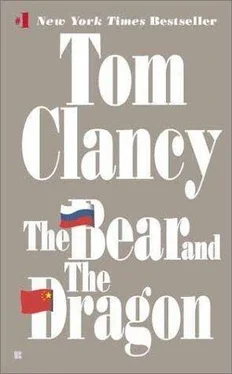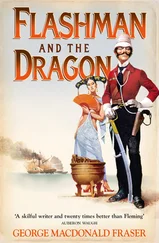Tom Clancy - The Bear and the Dragon
Здесь есть возможность читать онлайн «Tom Clancy - The Bear and the Dragon» весь текст электронной книги совершенно бесплатно (целиком полную версию без сокращений). В некоторых случаях можно слушать аудио, скачать через торрент в формате fb2 и присутствует краткое содержание. Год выпуска: 2001, ISBN: 2001, Жанр: Триллер, на английском языке. Описание произведения, (предисловие) а так же отзывы посетителей доступны на портале библиотеки ЛибКат.
- Название:The Bear and the Dragon
- Автор:
- Жанр:
- Год:2001
- ISBN:780425180969
- Рейтинг книги:3 / 5. Голосов: 1
-
Избранное:Добавить в избранное
- Отзывы:
-
Ваша оценка:
- 60
- 1
- 2
- 3
- 4
- 5
The Bear and the Dragon: краткое содержание, описание и аннотация
Предлагаем к чтению аннотацию, описание, краткое содержание или предисловие (зависит от того, что написал сам автор книги «The Bear and the Dragon»). Если вы не нашли необходимую информацию о книге — напишите в комментариях, мы постараемся отыскать её.
The Bear and the Dragon — читать онлайн бесплатно полную книгу (весь текст) целиком
Ниже представлен текст книги, разбитый по страницам. Система сохранения места последней прочитанной страницы, позволяет с удобством читать онлайн бесплатно книгу «The Bear and the Dragon», без необходимости каждый раз заново искать на чём Вы остановились. Поставьте закладку, и сможете в любой момент перейти на страницу, на которой закончили чтение.
Интервал:
Закладка:
But who?
And why?
Cui bonuo was the ancient question-old enough that the adage was in a dead language. To whom the good? Who profited from the deed?
He called Abramov and Ustinov. Maybe they could run Suvorov down, and then he’d fly north to interview the man. Provalov drafted the fax and fired it off to St. Petersburg, then left his desk for the drive home. He checked his watch. Only two hours late. Not bad for this case.
General Lieutenant Gennady Iosifovich Bondarenko looked around his office. He’d had his three stars for a while, and sometimes he wondered if he’d get any further. He’d been a professional soldier for thirty-one years, and the job to which he’d always aspired was Commanding General of the Russian Army. Many good men, and some bad ones, had been there. Gregoriy Zhukov, for one, the man who’d saved his country from the Germans. There were many statues to Zhukov, whom Bondarenko had heard lecture when he was a wet-nosed cadet all those years before, seeing the blunt, bulldog face and ice-blue determined eyes of a killer, a true Russian hero whom politics could not demean, and whose name the Germans had come to fear.
That Bondarenko had come this far was no small surprise even to himself. He’d begun as a signals officer, seconded briefly to Spetsnaz in Afghanistan, where he’d cheated death twice, both times taking command of a panic-worthy situation and surviving with no small distinction. He’d taken wounds, and killed with his own hands, something few colonels do, and few colonels relished, except at a good officers’ club bar after a few stiff ones with their comrades.
Like many generals before him, Bondarenko was something of a “political” general. He’d hitched his career-star to the coattails of a quasi-minister, Sergey Golovko, but in truth he’d never have gone to general-lieutenant’s stars without real merit, and courage on the battlefield went as far in the Russian army as it did in any other. Intelligence went further still, and above all came accomplishment. His job was what the Americans called J-3, Chief of Operations, which meant killing people in war and training them in peace. Bondarenko had traveled the globe, learning how other armies trained their men, sifted through the lessons, and applied them to his own soldiers. The only difference between a soldier and a civilian was training, after all, and Bondarenko wanted no less than to bring the Russian army to the same razor-sharp and granite-hard condition with which it had kicked in the gates of Berlin under Zhukov and Koniev. That goal was still off in the future, but the general told himself that he’d laid the proper foundation. In ten years, perhaps, his army would be at that goal, and he’d be around to see it, retired by then, of course, honorably so, with his decorations framed and hanging on the wall, and grandchildren to bounce on his knee … and occasionally coming in to consult, to look things over and offer his opinion, as retired general officers often did.
For the moment, he had no further work to do, but no particular desire to head home, where his wife was hosting the wives of other senior officers. Bondarenko had always found such affairs tedious. The military attaché in Washington had sent him a book, Swift Sword, by a Colonel Nicholas Eddington of the American Army National Guard. Eddington, yes, he was the colonel who’d been training with his brigade in the desert of California when the decision had come to deploy to the Persian Gulf, and his troops-civilians in uniform, really-had performed well: Better than well, the Russian general told himself. They’d exercised the Medusa Touch, destroying everything they’d touched, along with the regular American formations, the 10th and 11th cavalry regiments. Together that one division-sized collection of forces had smashed a full four corps of mechanized troops like so many sheep in the slaughter pen. Even Eddington’s guardsmen had performed magnificently. Part of that, Gennady Iosifovich knew, was their motivation. The biological attack on their homeland had understandably enraged the soldiers, and such rage could make a poor soldier into an heroic one as easily as flipping a light switch. “Will to combat” was the technical term. In more pedestrian language, it was the reason a man put his life at risk, and so it was a matter of no small importance to the senior officers whose job it was to lead those men into danger.
Paging through the book, he saw that this Eddington-also a professor of history, the flap said; wasn’t that interesting? — paid no small attention to that factor. Well, maybe he was smart in addition to being lucky. He’d had the good fortune to command reserve soldiers with many years of service, and while they’d only had part-time practice for their training, they’d been in highly stable units, where every soldier knew every other, and that was a virtually unknown luxury for regular soldiers. And they’d also had the revolutionary new American IVIS gear, which let all the men and vehicles in the field know exactly what their commander knew, often in great detail … and in turn told their commander exactly what his men saw. Eddington said that had made his job a lot easier than any mechanized-force commander had ever had it.
The American officer also talked about knowing not only what his subordinate commanders were saying, but also the importance of knowing what they were thinking, the things they didn’t have the time to say. The implicit emphasis was on the importance of continuity within the officer corps, and that, Bondarenko thought as he made a marginal note, was a most important lesson. He’d have to read this book in detail, and maybe have Washington purchase a hundred or so for his brother officers to read … even get reprint rights in Russia for it? It was something the Russians had done more than once.
CHAPTER 12 Conflicts of the Pocket
Okay, George, let’s have it,” Ryan said, sipping his coffee. The White House had many routines, and one that had evolved over the past year was that, after the daily intelligence briefing, the Secretary of the Treasury was Ryan’s first appointment two or three days of the week. Winston most often walked across-actually under-15th Street via a tunnel between the White House and Treasury Building that dated back to the time of FDR. The other part of the routine was that the President’s Navy messmen laid out coffee and croissants (with butter) in which both men indulged to the detriment of their cholesterol numbers.
“The PRC. The trade negotiations have hit the wall pretty hard. They just don’t want to play ball.”
“What are the issues?”
“Hell, Jack, what aren’t the friggin’ issues?” TRADER took a bite of croissant and grape jelly. “That new computer company their government started up is ripping off a proprietary hardware gadget that Dell has patented-that’s the new doohickey that kicked their stock up twenty percent, y‘know? They’re just dropping the things into the boxes they make for their own market and the ones they just started selling in Europe. That’s a goddamned violation of all sorts of trade and patent treaties, but when we point that out to them over the negotiating table, they just change the subject and ignore it. That could cost Dell something like four hundred million dollars, and that’s real money for one company to lose, y”know? If I was their corporate counsel, I’d be flipping through the Yellow Pages for Assassins ‘R Us. Okay, that’s one. Next, they’ve told us that if we make too big a deal of these ’minor’ disagreements, Boeing can forget the 777 order-twenty-eight aircraft they’ve optioned-in favor of Airbus.”
Ryan nodded. “George, what’s the trade balance with the PRC now?”
Читать дальшеИнтервал:
Закладка:
Похожие книги на «The Bear and the Dragon»
Представляем Вашему вниманию похожие книги на «The Bear and the Dragon» списком для выбора. Мы отобрали схожую по названию и смыслу литературу в надежде предоставить читателям больше вариантов отыскать новые, интересные, ещё непрочитанные произведения.
Обсуждение, отзывы о книге «The Bear and the Dragon» и просто собственные мнения читателей. Оставьте ваши комментарии, напишите, что Вы думаете о произведении, его смысле или главных героях. Укажите что конкретно понравилось, а что нет, и почему Вы так считаете.






![Александр Ирвин - Tom Clancy’s The Division 2. Фальшивый рассвет [litres]](/books/417744/aleksandr-irvin-tom-clancy-s-the-division-2-falsh-thumb.webp)




